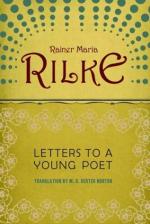
|
| Name: _________________________ | Period: ___________________ |
This test consists of 5 multiple choice questions, 5 short answer questions, and 10 short essay questions.
Multiple Choice Questions
1. In what year is the first letter from Rilke to the young poet written?
(a) 1903.
(b) 1909.
(c) 1910.
(d) 1902.
2. What type of locale is Rilke in as he is writing the fourth letter to the young poet?
(a) A city.
(b) A southern seaside.
(c) A farm.
(d) A rural plain.
3. What acquaintance do Rilke and the young poet have in common?
(a) Professor Horacek.
(b) Professor Kruppa.
(c) James Joyce.
(d) A distant cousin.
4. Rilke indicates that in the future, men and women will approach each other differently than they do at the time of his writing. How will they approach each other?
(a) Not as lovers, but as friends.
(b) Not as enemies, but as friends.
(c) Not as sexual objects, but as human beings.
(d) Not as opposites, but as human beings.
5. In the fourth letter, what does Rilke say he wishes human beings are more reverent toward?
(a) Art.
(b) Independence.
(c) Their sexuality.
(d) Solitude.
Short Answer Questions
1. Why isn't Rilke able to fill the request the young poet poses in his third letter to Rilke?
2. What city has Rilke departed from to come to the place where he composes the fourth letter?
3. What does Rilke enclose with his third letter to the young poet?
4. Which letter from the young poet is Rilke responding to with his fourth letter?
5. In the first letter, Rilke says he cannot offer critical commentary on the young poet's work. Why?
Short Essay Questions
1. What does Rilke say about the reading and re-reading of works by Jens Peter Jacobsen?
2. In letter four, Rilke says that "even the best err in words when they are meant to mean most delicate and almost inexpressible things." What does this mean?
3. Rilke tells the young poet in the first letter that the only way for the poet to improve his writing is to "go into yourself". What does this mean?
4. What does Rilke mean when, in the first letter, he suggests that critical commentary on art results in "happy misunderstandings"?
5. Rilke says that artists remains unaware of their best qualities. Why is this?
6. What type of writing does Rilke advocate for?
7. What does Rilke mean when, in letter four, he says that physical pleasure is not bad, but that physical pleasure is often "misuse[d] and squander[ed]"?
8. What does Rilke mean when, in letter four, he says that man "might be more reverent toward his fruitfulness, which is but one, whether it seems mental or physical..."?
9. What reason does Rilke give for advising the young poet against writing love poems?
10. What can we infer from the fact that in the first letter, Rilke's closing salutation is with "with sympathy?"
|
This section contains 953 words (approx. 4 pages at 300 words per page) |

|




